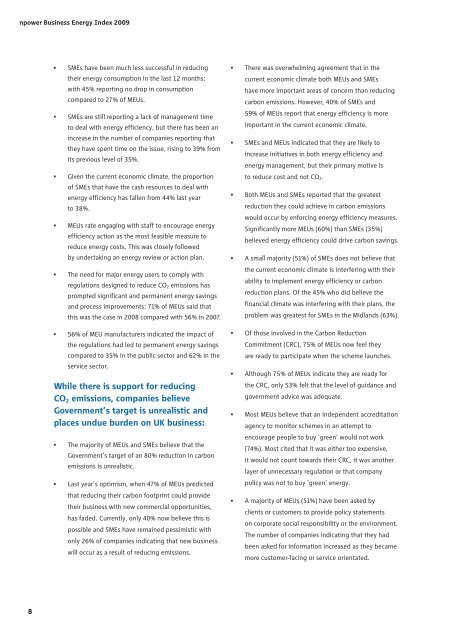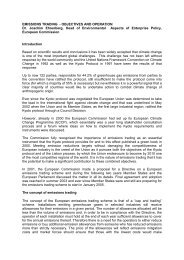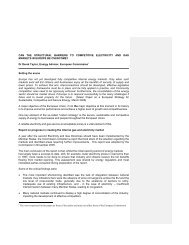Business Energy Users Survey - Winter 2008/09 - Moffatt Associates
Business Energy Users Survey - Winter 2008/09 - Moffatt Associates
Business Energy Users Survey - Winter 2008/09 - Moffatt Associates
Create successful ePaper yourself
Turn your PDF publications into a flip-book with our unique Google optimized e-Paper software.
npower <strong>Business</strong> <strong>Energy</strong> Index 20<strong>09</strong>npower <strong>Business</strong> <strong>Energy</strong> Index 20<strong>09</strong>•SMEs have been much less successful in reducingtheir energy consumption in the last 12 months:with 45% reporting no drop in consumptioncompared to 27% of MEUs.•There was overwhelming agreement that in thecurrent economic climate both MEUs and SMEshave more important areas of concern than reducingcarbon emissions. However, 40% of SMEs andSection One Commentary:<strong>Energy</strong> Costs•••••SMEs are still reporting a lack of management timeto deal with energy efficiency, but there has been anincrease in the number of companies reporting thatthey have spent time on the issue, rising to 39% fromits previous level of 35%.Given the current economic climate, the proportionof SMEs that have the cash resources to deal withenergy efficiency has fallen from 44% last yearto 38%.MEUs rate engaging with staff to encourage energyefficiency action as the most feasible measure toreduce energy costs. This was closely followedby undertaking an energy review or action plan.The need for major energy users to comply withregulations designed to reduce CO 2 emissions hasprompted significant and permanent energy savingsand process improvements: 71% of MEUs said thatthis was the case in <strong>2008</strong> compared with 56% in 2007.56% of MEU manufacturers indicated the impact ofthe regulations had led to permanent energy savingscompared to 35% in the public sector and 62% in theservice sector.While there is support for reducingCO 2 emissions, companies believeGovernment’s target is unrealistic andplaces undue burden on UK business:••The majority of MEUs and SMEs believe that theGovernment’s target of an 80% reduction in carbonemissions is unrealistic.Last year’s optimism, when 47% of MEUs predictedthat reducing their carbon footprint could providetheir business with new commercial opportunities,has faded. Currently, only 40% now believe this ispossible and SMEs have remained pessimistic withonly 26% of companies indicating that new businesswill occur as a result of reducing emissions.•••••••59% of MEUs report that energy efficiency is moreimportant in the current economic climate.SMEs and MEUs indicated that they are likely toincrease initiatives in both energy efficiency andenergy management, but their primary motive isto reduce cost and not CO 2.Both MEUs and SMEs reported that the greatestreduction they could achieve in carbon emissionswould occur by enforcing energy efficiency measures.Significantly more MEUs (60%) than SMEs (35%)believed energy efficiency could drive carbon savings.A small majority (51%) of SMEs does not believe thatthe current economic climate is interfering with theirability to implement energy efficiency or carbonreduction plans. Of the 45% who did believe thefinancial climate was interfering with their plans, theproblem was greatest for SMEs in the Midlands (63%).Of those involved in the Carbon ReductionCommitment (CRC), 75% of MEUs now feel theyare ready to participate when the scheme launches.Although 75% of MEUs indicate they are ready forthe CRC, only 53% felt that the level of guidance andgovernment advice was adequate.Most MEUs believe that an independent accreditationagency to monitor schemes in an attempt toencourage people to buy ‘green’ would not work(74%). Most cited that it was either too expensive,it would not count towards their CRC, it was anotherlayer of unnecessary regulation or that companypolicy was not to buy ‘green’ energy.A majority of MEUs (51%) have been asked byclients or customers to provide policy statementson corporate social responsibility or the environment.The number of companies indicating that they hadbeen asked for information increased as they becamemore customer-facing or service orientated.After a relatively stable period during 2007, both largeand small businesses have seen energy rise as apercentage of total operating costs. In the last twelvemonths 81% of businesses have seen an increase, withthe average increase of 42.7% compared to 18% reportedthis time last year.While this represents a sizeable shift year on year, it islower than the average rise reported in nBEI3 in 2006(46%), demonstrating the volatility in the energy markets.Notably, more businesses are also reporting that energynow represents an average of 10-20% of their operatingcosts, up from 7% to 16% of businesses – the highestfor three years. This is a trend that many anticipate willcontinue in the long-term. Respondents predict energycosts will rise over the next three years by an averageof 9.8%.However, many are optimistic that prices will decreasein the next six months. While some businesses expectenergy prices to increase by an average of 18% duringthis time, the majority expected energy costs to fall bythe same figure. The greatest optimism is reported bymanufacturing MEUs, with 80% of respondents expectingcost reductions. Indeed, the majority of MEUs (55%)predict price decreases with an estimated fall of 13%,compared to 11% in 20<strong>09</strong>. Also, a significant minorityof MEUs (43%) reported that costs have already fallen inline with recent falls in oil and gas prices.Anecdotally, other MEUs are also hopeful that the benefitof energy efficiency and waste reduction measures willhelp to mitigate against future cost increases, adding tothe general optimism.Interestingly, many more businesses are aware of thefuture impact of energy costs on their operations whencompared to previous reports, suggesting a greater insightand attention to energy use. Only 7.4% of businessescould not say what proportion of operating costs would beattributable to energy in three years, a significant changefrom the 57% of businesses in nBEI5.Fossil fuel price movement has consistently been reportedas the main factor influencing energy prices since thefirst nBEI in 2004 and respondents rate this as 6.19 outof ten in terms of its influence in this Index. At the sametime, businesses seem to be attributing less influenceto environmental regulations and obligations, typicallyseen as the second most important factor during thehistory of the nBEI. This is now rated third at 5.55,just after supplier charges, which is considered to havea significance of 5.64 out of 10. What is interesting inthis Index is that the factors influencing energy costsare now considered more evenly, with ratings now muchcloser than in previous reports in which a key influenceremerged. This points to greater awareness amongbusinesses of the nature and variety of factors thatinfluence energy costs.The impact that rising energy costs is having onbusinesses generates a mixed response. While themajority of MEUs (53%) reports that costs are decreasingprofitability, this is the same figure as in the last nBEIwhen energy costs were largely more stable. It suggeststhat large businesses, at least, have taken measures tomanage rising costs. Indeed, 33% of MEUs say there hasbeen no impact on their profitability and the majority(56%) report no change to their competitiveness.Cost management is often seen as a driver for efficiencymeasures so it is interesting to note this time thatthe number of MEUs reporting changes to productionprocesses has dropped from 52% in the last Index to 28%now. Similarly, changes to equipment/technologies hasgone from 62% in nBEI5 to 42% this time, although thisis still slightly higher than those who expect to take noaction (40%). Again, it is possible that many have alreadymade changes to deliver energy reductions and are nowmeasuring the benefit of these before reinvesting.The picture is similar for SMEs. Increasing numbersof small businesses say that energy costs have decreasedprofitability, with 58% saying this, compared to 37% in<strong>2008</strong>. Despite the shift, this is still lower than the data innBEIs four and three, when 76% of SMEs reported lower89




